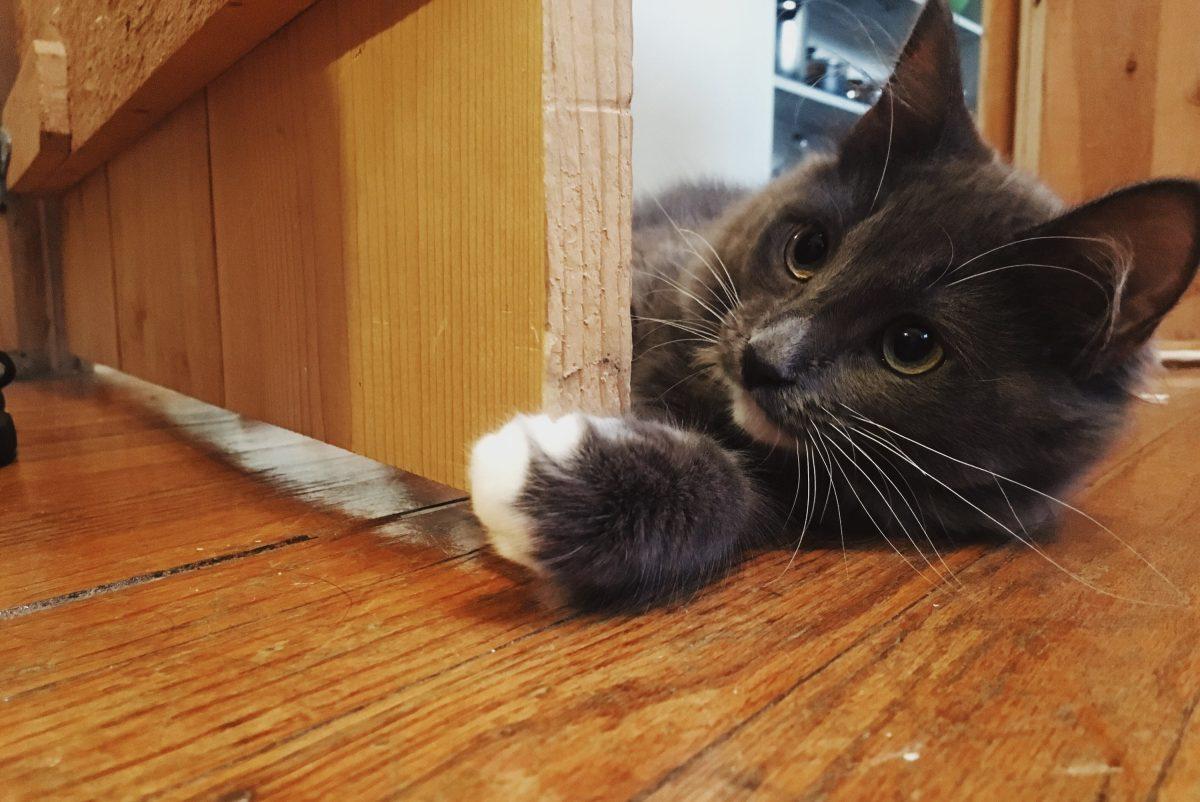St. Joe’s students seek four-legged companions
Henry had no idea that what was left of his nine lives would change when roommates Mikayla Birney ’19 and Angie Barone ’19 walked through the doors of the North Philadelphia SPCA last summer.
Birney and Barone had been itching to adopt another kitten ever since taking in a stray cat during their sophomore year.
Since June is recognized as National Adopt a Shelter Cat Month, the SPCA made their cats adoptable for $20.
“It was good that he was only $20 because we were definitely broke, but we really wanted a cat,” Barone said.
Like many other shelter animals, Henry had a rough start in life. He was a battered cat rescued from a bad home and showed up at the SPCA gaunt, anxious and lethargic.

Henry’s condition, as seen in many other rescue animals, increased the responsibility Birney and Barone were taking on.
“I consider adopting a pet much the same as having a child,” said Christine Daniels, president of the non-profit organization Spay and Save. “I think the responsibility and the commitment need to be the same.”
The two roommates recognized that responsibility from the start and they think it should guide other students who are considering adopting pets while still in college.
“It is taking care of another living being, so it is something you need to consider and think about,” Birney said. “Don’t just do it on a whim.”
Like Birney and Barone, college students often choose to adopt animals for emotional support. Such animals are distinct from emotional-support animals, or ESAs.
People with ESAs often have mental health concerns and are “prescribed” a pet by their doctors out of a medical necessity. Many students, though, said they benefit from the emotional support an animal provides.
Adopted animals are “5,000 percent” emotionally supportive, said Lucia Casaleno ’19, owner of kitten Mona Lisa.
“All three of my roommates and I suffer from panic attacks sometimes, and it’s just very soothing to have her there,” Casaleno said.
Along with the benefits, adopting a pet while in college can pose significant challenges in a student’s daily life.
Students have to make room for their pets in their often busy schedules, said Liz Mitchell ’19, owner of Dani, a Staffordshire terrier.
“I definitely don’t spend as much time on campus now anymore,” Mitchell said. “I used to spend all day on campus, but now I just go home because I’m with her.”
Mitchell also said she recognizes how high-stress times during the semester, such as midterms or finals, are even more overwhelming when she has to focus on studying while still caring for Dani.
“I think that folks need to realize that pets are not property,” Mitchell said. “Pets are family and the commitment should be for life.”
Morgan Polley, public relations and development specialist for ACCT Philly, the area’s largest animal shelter, agreed that adopting an animal is a lifetime commitment, especially if you adopt a young pet.
Polley said for college students, residential logistics can also be a challenge.
“A lot of landlords either don’t allow pets, have a restriction on the types of pets, or require a fee, so always make sure you’re able to have pets where you are,” Polley said.
ACCT Philly requires potential adopters to prove that they are legally allowed to have animals in their place of residence. Residence halls at St. Joe’s do not allow pets, so students have to wait until they move off-campus to adopt an animal.
Some shelters also require proof of financial stability. Thomas Hauk ’20 had to prove he could afford to care for his kitten Cannoli.

“It is very reasonable because they want to make sure you can pay for the animal, and it’s going to a good home,” Hauk said. “But that’s oftentimes tough for college kids that don’t necessarily work all year.”
And then there is the issue of roommates.
“Make sure everybody is on board with taking care of an animal,” Polley said.
Students must also consider what happens after graduation when they and their roommates part ways, but each still has an emotional attachment to the adopted animal.
In Birney and Barone’s case, Henry belongs to both women. Who takes him when they graduate?
“We get that question all the time,” Barone said. “We really don’t talk about it because we don’t like to think about not having him together. ”















































